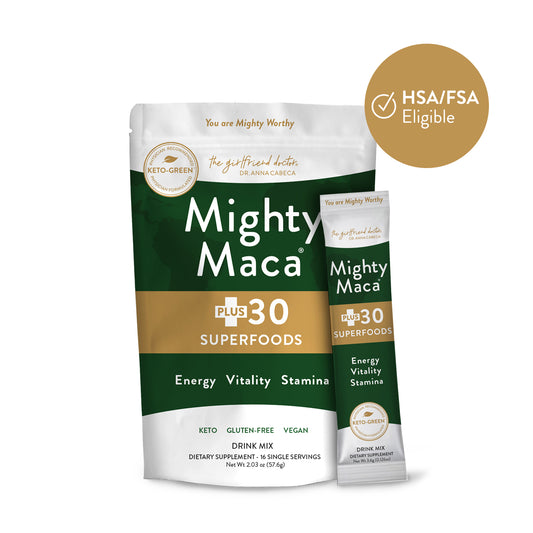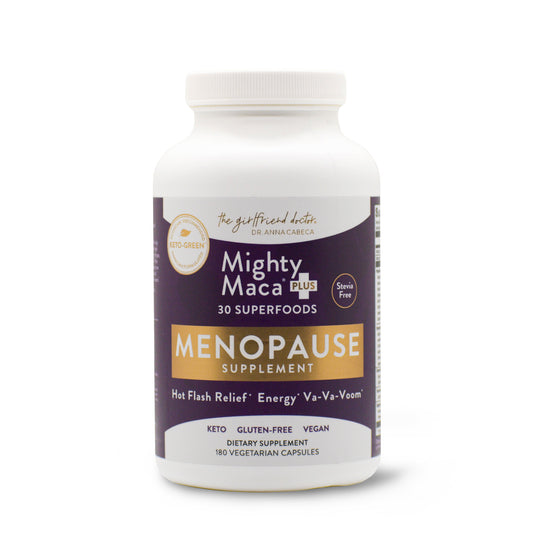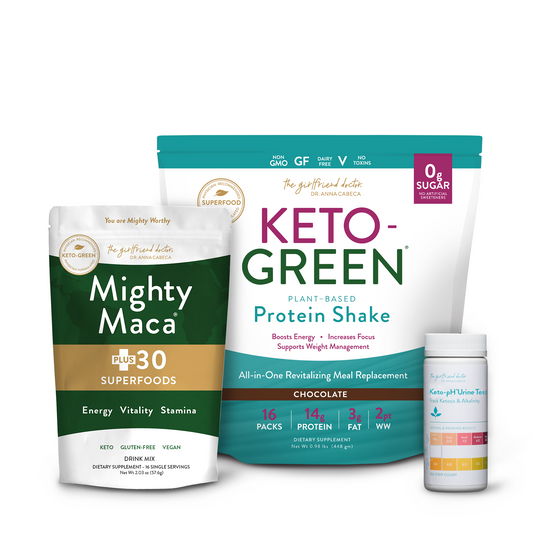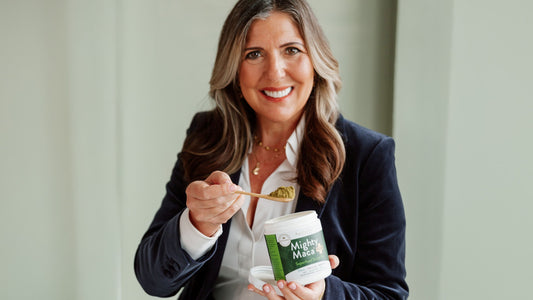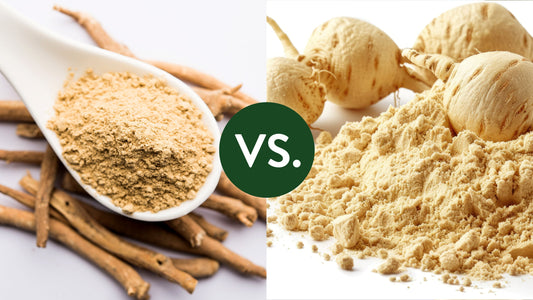It starts innocently enough. You walk into a room and forget why you were there. Then you start to notice you can’t seem to focus on demanding tasks the way you used to. Maybe you get frustrated by simple things more easily these days. You’re worried all the time and you’re not sure why. Or you find your motivation has tanked.
Maybe you even find yourself wondering: is it menopause brain fog or dementia?
This is what menopause brain fog takes from you. It steals your fire and makes you feel afraid.
But it doesn’t have to be like this forever, Girlfriend.
In this article, I’m going to walk you through the best supplements for menopause brain fog and guide you through small things you can do every day to help support your brain health during perimenopause, menopause, and beyond. Because forgetfulness, irritability, depression, and lack of focus are not just things you have to live with throughout this transition.

Unfortunately, menopause and brain fog often go hand in hand. Why is that? The short answer is that your sex hormones have much more to do with your brain function than you realize.
Estrogen, in particular, has neuroprotective properties and is involved in various brain functions, including mood regulation, memory, and cognitive tasks. As estrogen levels drop during menopause, many women experience noticeable changes in these areas. (1,2)
And then there’s progesterone. Which is intimately tied to your mood and the Gamma-aminobutyric acid (GABA) receptors in your brain. GABA is a neurotransmitter that helps you feel calm and less worried. (3-6)
Even testosterone, which tends to decrease dramatically during menopause, impacts cognition. (7)
When your hormone levels decrease, it can also affect sleep patterns and stress levels — which both can exacerbate cognitive symptoms like menopausal brain fog.
So let’s take a look at some of the supplements that could help brain fog during menopause and how they support your body and brain.
Best Supplements For Menopause Brain Fog
So, what supplements help menopause brain fog? I typically recommend supplements as part of a holistic menopause treatment plan. And that’s because menopause brain fog supplements work best when they tackle your menopause symptoms from multiple angles.
Here are some of my favorite, hard-working supplements for brain fog with menopause.
Maca root is an herb that has a special relationship with your adrenal glands. Your adrenals have two basic modes: one, they pump out cortisol (and you feel stressed, wired, and tired) or two, they can produce dehydroepiandrosterone (DHEA) which your body takes and makes into hormones.
Maca helps nourish your adrenals and keeps them more likely to pump out DHEA instead of going into straight cortisol production mode.
This helps you feel less stressed and helps keep your hormones balanced.
But what’s really interesting is that studies indicate maca could help reduce the psychological symptoms of menopause independent of its potential hormone-supportive actions. (8) Animal studies have also shown maca can help improve the learning and memory centers of the brain. (9,10) And a review of the literature in 2014 suggested maca was beneficial for the same. (11)
My pick in this category is my Mighty Maca® Plus — which comes in both a powdered drink mix and capsules. If you’re looking for a powerhouse to help support your body with every facet of menopause, be sure to check it out.
It’s estimated up to 15% of the population is clinically deficient in magnesium. (12) But some evidence suggests half of us (likely more!) have sub-optimal levels. (13)
Magnesium is crucial for hundreds of functions in your body. And your brain especially needs magnesium. Evidence suggests magnesium is neuroprotective and required for nerve transmission and neuromuscular conduction. (14,15)
It’s no wonder higher magnesium intake is associated with lower risk of stroke. (16)
But since most of us aren’t getting enough magnesium through our diet, and it’s so important for brain function and protection, a magnesium supplement is often a good idea.
So, which magnesium is best for your brain and brain fog?
Hands down, magnesium L-threonate, which is the only form of magnesium proven in animal studies to cross the blood-brain barrier. (17)
It’s the superstar in my Better Brain and Sleep formula, which combines several forms of magnesium to support healthy magnesium levels in your brain. Check it out here.
Omega-3 fatty acids are known as essential fats. These are nutrients that your body needs to function properly, but you have to ingest them — your body can’t make them. Omega 3 fatty acids are part of the cellular membrane of all of your tissues, and that’s what makes them so essential. (18)
There are three main essential fatty acids: alpha-linolenic acid (ALA), docosahexaenoic acid (DHA), and eicosapentaenoic acid (EPA). EPA and DHA in particular are known for their role in brain health. These fats help maintain the integrity of your brain cells. And they facilitate neurotransmitters as well.
The standard American diet is quite low in EPA and DHA. (19)
They’re most abundantly found in foods like cold water fatty fish, algae, and seaweeds. These aren’t foods that we typically load our plates with. And that’s why an Omega-3 supplement can come in handy, especially when you’re battling brain fog in menopause.
Omega-3s are great at supporting your body in a multitude of ways in menopause. Sure, they help bolster your brain, which is about 60% fat. (20) But they also support heart health and insulin metabolism, too. And these are two core parts of your menopausal health that you cannot ignore.
Just be careful when you’re looking at Omega-3 supplements. Because they typically come from fish, you have to select a high-quality source that filters out impurities and uses reputable manufacturing processes.
Check out my favorite Omega-3 supplement here — no fish burps and small capsules!
As I mentioned earlier, your brain’s made up of about 60% fat. The rest is protein, water, carbohydrates, and salts. (21)
Because your brain is made up of a good bit of protein, it relies heavily on amino acids (the building blocks of protein) to function at its best. (22)
That’s because your brain takes amino acids and turns them into neurotransmitters and neuromodulators. Those neurotransmitters, like serotonin and dopamine, are crucial for regulating your mood, memory, and attention.
One high-quality recent study showed that when middle-aged and older adults consumed a blend of seven amino acids, their attention and cognition improved. (23)
And that’s exactly why I recommend adding a plant-based protein powder to your daily supplement regimen.
I drink a Keto-Green® shake every day because it’s packed with high-quality vegan protein, minerals, and menopause-supportive ingredients. Check it out here.
We can’t talk about your brain health without talking about progesterone. Everyone laments the fact that we lose estrogen as we age. But the loss of progesterone is just as profound, especially for your brain.
Once you hit early perimenopause (typically around age 35-45) your progesterone levels take a sharp decline.
I mentioned this earlier, but progesterone interacts with GABA receptors in your brain. And because GABA is a neurotransmitter that helps you feel calm — when you have less progesterone circulating in your body, you can feel more anxious, worried, and forgetful.
This is one of the key things that supplementation with bio-identical progesterone can really help support. Many women feel an almost instant hit of relief with a bit of progesterone cream applied directly to thinner areas of the skin.
Some doctors prescribe benzodiazepines to women in menopause who feel anxious and brain foggy. This is because benzodiazepines (like Xanax) work by interacting with those GABA receptors in your brain. (24) But be careful, benzodiazepines come with some serious potential side effects, and really aren’t meant to be taken long-term. (25)
I love to use my natural progesterone cream, Balance, as a first line of defense instead.
If you have brain fog, one of the key things to check is your vitamin D levels. Because most of us are not getting enough vitamin D. According to government estimates, a staggering 97% of women get less than the estimated average requirement (EAR) of vitamin D from the food they eat and beverages they drink. This means that even though so many of our processed foods are fortified with vitamin D, it’s not enough. (26)
Sure, you can also get vitamin D from sun exposure. When sunlight touches your skin, a natural compound known as 7-dehydrocholesterol absorbs UV B radiation. This compound then undergoes a conversion into previtamin D3, which in turn converts to vitamin D3. (27)
But this process also poses significant risks.
Why?
Exposure to even brief periods of sunlight can subject you to UV radiation, which harms your skin. UV radiation is recognized as a carcinogen, contributing to the development of skin cancer. (28)
And here’s the truth: most of us just aren’t spending enough time outdoors to initiate the process of converting sun exposure into vitamin D. We go from our house to our car to our office and back again. And during cloudy days in winter, there aren’t really enough UV-B rays to help you produce vitamin D.
But if you turn to a vitamin D supplement to fill in the gaps, be careful. If you consume vitamin D without vitamin K2, it can lead to a build-up of calcium in your blood and lead to high blood pressure!
Check out my Ray of Strength formula which contains the perfect ratio of vitamin D and K here.
Zinc is one of those humble minerals that we don’t give enough credit to.
It’s found in high concentrations in your neurons throughout your brain — from your cortex to amygdala. And it plays a role in the regulation of neurotransmitters, the chemical messengers that allow communication between neurons. It is involved in the synthesis, storage, and release of neurotransmitters such as glutamate, which is important for learning and memory. (29)
Zinc promotes neurogenesis, which is the growth of brain cells. Zinc activates dozens of enzymes involved in neuronal metabolism. And zinc acts as a regulator of synaptic activity and neuronal plasticity at the cellular level.
Plus, several neurological diseases may be affected by changes in zinc status, including neurodegenerative diseases, traumatic brain injuries, stroke, and depression. (30) Researchers suspect that zinc deficiency could result in declines in cognition, memory, and learning and an increase in oxidative stress. (31)
And yet, zinc is one of those nutrients that we don’t prioritize. You can get zinc from food, but also it’s found most abundantly in foods like oysters and red meat. Great if you live near the ocean or you don’t have to worry about saturated fats, but that leaves out a lot of people.
Here’s what I take to keep my zinc levels optimal.


At the top of my list of brain fog natural remedies is sleep. Getting adequate sleep (ideally 7-9 hours per night) is one of the most important things you can do for your brain health.
During sleep, your brain performs all sorts of important maintenance tasks, from consolidating your memories to forming new neural connections. And when you don’t get enough, it can exacerbate brain fog and mood disorders.
For great sleep hygiene, be sure to leave your devices out of the bedroom at night, and sleep in a cool, dark space.
If you need a little extra help in the getting-to-and-staying-asleep department, my Nite-Zzz Caps provide gentle relaxing sleep support and help with hot flashes and night sweats.

You’ve probably heard me tout the many benefits of exercise before, but did you know that exercise can help your brain?
Studies indicate even a modest workout regimen of 3-5 weeks of cardio can increase your brain’s brain-derived neutrophic factor (BDNF). BDNF is a protein present in the brain, that promotes neuroplasticity, the brain's capacity to develop and adapt. Higher BDNF levels correlate with enhanced cognitive function, while lower levels are linked to neurodegenerative disorders and depression. (32)
Other research showed an increase in the volume of the hippocampus after exercise. Which is important, because the hippocampus tends to shrink as you age. (33)
I believe the best exercise routine is the one you’ll actually do. But if you need some ideas, be sure to check out this article.

Your diet is so important to your brain health. As we’ve already discussed, your brain needs lots of healthy fats and protein to function at its best.
If you’re currently experiencing brain fog episodes and your diet includes lots of processed carbohydrates, or you’re insulin resistant — then I’d encourage you to check out my signature Keto-Green diet. It emphasizes healthy fats and an abundance of green veggies for a brain health boost.
Insulin resistance can interfere with glucose metabolism in your brain which is why it makes you feel foggy. Plus, the inflammation caused by insulin resistance can impair cognitive dysfunction and may even promote the accumulation of proteins in the brain which are associated with neurodegenerative disease.

Did you know that stress also affects your brain health?
Yes, chronic stress can have profound effects on brain function. In fact, it can lead to inflammation and even possibly damage your hippocampus.
I know you can’t just stop stress in your life. But implementing some stress management techniques can be key to getting your brain fog under control. Things like mindfulness practices and physical activity can help mitigate the cognitive effects of stress and promote mental clarity.

One thing your brain loves is a good challenge.
Don’t forget to do something every day that keeps your brain active and always solving problems.
Whether you love a good crossword puzzle, wordle, or sudoku, there are plenty of brain-training games you can play to help keep brain fog at bay.
Does Menopause Brain Fog Go Away?
While brain fog, forgetfulness, irritability, and lack of focus may be a part of your life now, for most women, we see all of this subside eventually.
And I hope this guide helped you find some solutions that can support you throughout your menopause transition.
References
- https://jnnp.bmj.com/content/74/7/837
- https://www.ncbi.nlm.nih.gov/pmc/articles/PMC4491541/
- https://www.ncbi.nlm.nih.gov/pmc/articles/PMC6533804/
- https://www.ncbi.nlm.nih.gov/pmc/articles/PMC7432434/
- https://www.ncbi.nlm.nih.gov/pmc/articles/PMC7821816/
- https://www.ncbi.nlm.nih.gov/pmc/articles/PMC9245048/
- https://www.ncbi.nlm.nih.gov/pmc/articles/PMC4330791/
- https://pubmed.ncbi.nlm.nih.gov/18784609/
- https://www.researchgate.net/profile/Julio-Rubio-3/publication/51513238_Doseresponse_effect_of_black_maca_Lepidium_meyenii_in_mice_with_memory_impairment_induced_by_ethanol/links/579ccf1608ae6a2882f2e766/Doseresponse-effect-of-black-maca-Lepidium-meyenii-in-mice-with-memory-impairment-induced-by-ethanol.pdf
- https://www.ncbi.nlm.nih.gov/pmc/articles/PMC5018343/
- https://www.sciencedirect.com/science/article/pii/S2221169115300162
- https://www.ncbi.nlm.nih.gov/books/NBK500003/
- https://www.sciencedaily.com/releases/2018/02/180226122548.htm
- https://www.ncbi.nlm.nih.gov/pmc/articles/PMC9820677/
- https://www.ncbi.nlm.nih.gov/pmc/articles/PMC6024559/
- https://www.sciencedirect.com/science/article/pii/S0002916523026576
- https://www.ncbi.nlm.nih.gov/pmc/articles/PMC9786204/
- https://www.ncbi.nlm.nih.gov/pmc/articles/PMC2174995/
- https://www.ncbi.nlm.nih.gov/pmc/articles/PMC3992162/
- https://pubmed.ncbi.nlm.nih.gov/20329590
- https://www.hopkinsmedicine.org/health/conditions-and-diseases/anatomy-of-the-brain#:~:text=What%20is%20the%20brain%20made,is%20a%20not%20a%20muscle.
- https://www.ncbi.nlm.nih.gov/books/NBK224629/
- https://www.frontiersin.org/articles/10.3389/fnut.2020.586166/full
- https://www.sciencedirect.com/topics/pharmacology-toxicology-and-pharmaceutical-science/benzodiazepine-receptor
- https://www.aafp.org/pubs/afp/issues/2013/0815/p224.html
- https://ods.od.nih.gov/factsheets/VitaminD-HealthProfessional/
- https://www.ncbi.nlm.nih.gov/books/NBK441912/
- https://www.cancer.org/cancer/risk-prevention/sun-and-uv/uv-radiation.html#:~:text=Solar%20radiation%20is%20known%20to,to%20be%20a%20human%20carcinogen.
- https://www.ncbi.nlm.nih.gov/pmc/articles/PMC9312494/
- https://genesandnutrition.biomedcentral.com/articles/10.1007/s12263-013-0379-x
- https://www.ncbi.nlm.nih.gov/pmc/articles/PMC9855948/
- https://pubmed.ncbi.nlm.nih.gov/21722657/
- https://pubmed.ncbi.nlm.nih.gov/21282661/







